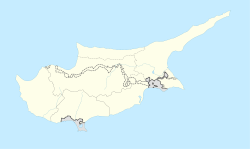Ayios Nikolaos Station
| Ayios Nikolaos Station | |
|---|---|
Άγιος Νικόλαος | |
| Dhekelia Cantonment in Sovereign Base Areas of Akrotiri and Dhekelia, Cyprus | |
 Satellite and other communications antennas at Ayios Nikolaos Station | |
| Coordinates | 35°05′35″N 33°53′12″E / 35.09306°N 33.88667°E |
| Type | Signals intelligence gathering station |
| Site information | |
| Owner | Ministry of Defence |
| Operator | Strategic Command |
| Controlled by | British Forces Cyprus |
| Condition | Operational |
| Website | Ayios Nikolaos Station at GOV.UK |
| Site history | |
| Built | c. 1946 |
| In use | 1946 – present |
| Events | Cyprus Seven Trial (1985) |
| Garrison information | |
| Garrison | Joint Service Signal Unit, Cyprus |
Ayios Nikolaos Station (also spelled Agios Nikolaos; Greek: Άγιος Νικόλαος, lit. "Saint Nicholas") is a British military station and part of the British Sovereign Base Area of Dhekelia in Cyprus. It is a former village (Ayios Nikolaos, SBA) connected by a road to the main area of the Dhekelia Garrison. The Joint Service Signal Unit (Cyprus) (JSSU(Cyp)), formerly 9th Signal Regiment and the Royal Air Force's 33 Signals Unit, is based at Ayios Nikolaos. This unit is a British Armed Forces run electronic intelligence gathering station.[1]
The current superior body to JSSU (Cyp) appears to be the Joint Service Signal Organisation.[2] The JSSO, as of 2012, was located at RAF Digby in Lincolnshire, under the command of a Group Captain of the RAF Operations Support Branch and had 1,600 staff which are drawn from all three services.[3]
History
The station was established at Ayios Nikolaos shortly after the Second World War.[4] In 1946 2 Wireless Company and 2 Special Wireless Group merged to become 2 Wireless Regiment RSigs. In 1959 2 Wireless Regiment became 9 Signal Regiment.[5]
In early 1956 No. 751 Signals Unit RAF, a mobile radar convoy, was located at RAF Ayios Nikolaos. The unit radars initially comprised one Type 15, two Type 14s, and two Type 13s, conducting air defence.[6] It moved to Cape Greco after March 1956.[7] It was located there until 1959.[8]
There were a number of court cases involving servicemen from the regiment during the 1980s, including the Cyprus Seven Trial, an alleged spy-ring operating at Ayios Nikolaos Station in 1984.[9]
The Joint Service Signal Unit (Cyprus) (or JSSU (Cyp)) was formed on 1 April 1999, as a result of the amalgamation of the Joint Service Signal Unit (Ayios Nikolaos) and elements of 33 Signals Unit RAF.[10] It is a three-squadron organisation, commanded by a Royal Signals Lieutenant Colonel, with a number of Royal Air Force and civilian contractors attached. Ayios Nikolaos or Agios Nikolaos is a very common place name in Greece and Cyprus; it is Greek for "Saint Nicholas".[11]
For satellite interception, the Ayios Nikolaos station has a number of dish antennas of various sizes. Somewhere between 2008 and 2011, also a torus antenna was installed, which is able to receive the signals of up to 35 satellites simultaneously.[12]
Declassified documents show that the station was run for the Government Communications Headquarters (GCHQ), and documents released by Edward Snowden indicate that in recent years half the cost of running the station is funded by the U.S. National Security Agency (NSA).[13] Süddeutsche Zeitung newspaper described the base as an Anglo-American collaborative project and wrote that the NSA has personnel on the base, in violation of the agreement between the British and Cypriot governments. GCHQ and NSA use the Ayios Nikolaos station for their global eavesdropping operation.[14] It became the largest GCHQ site outside the UK.[4]
See also
References
- ^ Jeffrey T. Richelson & Desmond Ball, The Ties the Bind: Intelligence Cooperation between the UKUSA Countries, Unwin Hyman, Boston/London and others, 1990, p.194 note 145.
- ^ (JSSU (Cyp)), accessed January 2019.
- ^ "Defence Intelligence: roles". Ministry of Defence. 16 September 2014. Retrieved 20 June 2019.
- ^ a b Georgiou, Giorgos. "British Bases in Cyprus and Signals Intelligence" (PDF). Retrieved 22 October 2017.
- ^ Lord, Cliff; Watson, Graham (2012). The Royal Corps of Signals: Unit Histories of the Corps (1920-2001) and Its Antecedents. Helion & Company Limited. pp. 41–42. ISBN 9781874622925.
- ^ O'Reilly
- ^ Terry O'Reilly (2015). The Dustbin Bandits: A Story of RAF 751 Signals Unit in Cyprus 1956 to 1958. Amazon (Kindle Edition).
- ^ Operational Record Book No 751 Signals Unit (SU), Cape Greco.
- ^ De Young, Karen (16 June 1985). "British Prosecutors Open Case Against 7 Servicemen for Spying". Washington Post. Retrieved 26 March 2019.
- ^ Ayios Nikolaos Station archived on 5 August 2009 from the original Archived 9 November 2009 at the Wayback Machine
- ^ "Location of St. Nicholas Church". Agios Nikolaos. Retrieved 18 October 2017.
- ^ Electrospaces.net: Torus: the antenna to significantly increase satellite interception, 8 April 2015
- ^ "GCHQ worked hard to maintain presence on Cyprus after independence". Gloucestershire Echo. 1 December 2013. Archived from the original on 14 April 2015.
- ^ Obermaier, Frederik (5 November 2013). "NSA und GCHQ auf Zypern - Insel der Spione". Süddeutsche.de (in German). Retrieved 25 September 2024.

